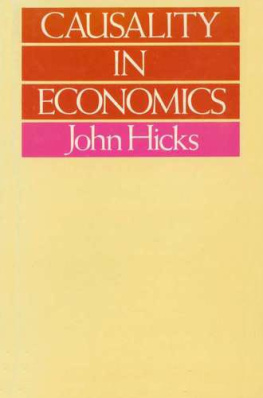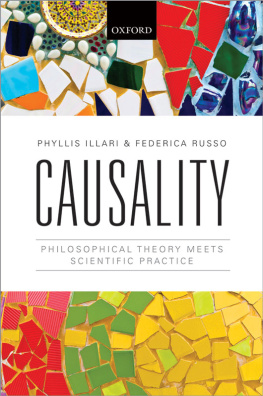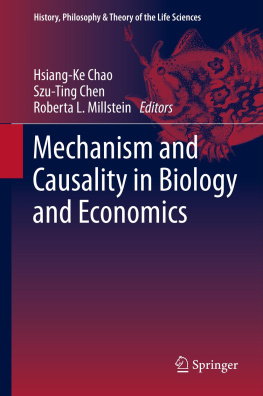John Hicks - Causality in Economics
Here you can read online John Hicks - Causality in Economics full text of the book (entire story) in english for free. Download pdf and epub, get meaning, cover and reviews about this ebook. year: 1979, publisher: Blackwell Publishers, genre: Art. Description of the work, (preface) as well as reviews are available. Best literature library LitArk.com created for fans of good reading and offers a wide selection of genres:
Romance novel
Science fiction
Adventure
Detective
Science
History
Home and family
Prose
Art
Politics
Computer
Non-fiction
Religion
Business
Children
Humor
Choose a favorite category and find really read worthwhile books. Enjoy immersion in the world of imagination, feel the emotions of the characters or learn something new for yourself, make an fascinating discovery.
- Book:Causality in Economics
- Author:
- Publisher:Blackwell Publishers
- Genre:
- Year:1979
- Rating:3 / 5
- Favourites:Add to favourites
- Your mark:
- 60
- 1
- 2
- 3
- 4
- 5
Causality in Economics: summary, description and annotation
We offer to read an annotation, description, summary or preface (depends on what the author of the book "Causality in Economics" wrote himself). If you haven't found the necessary information about the book — write in the comments, we will try to find it.
Causality in Economics — read online for free the complete book (whole text) full work
Below is the text of the book, divided by pages. System saving the place of the last page read, allows you to conveniently read the book "Causality in Economics" online for free, without having to search again every time where you left off. Put a bookmark, and you can go to the page where you finished reading at any time.
Font size:
Interval:
Bookmark:
CAUSALITY
IN ECONOMICS
JohnHicks
BasicBooks, Inc., Publishers
NEW YORK
Libraryof Congress Number: 79-7346
ISBN: 0-465-00900-X
Copyright 1979 by Sir John Hicks
Printed in the United States of America
10 9 8 7 6 5 4 3 2 1
CONTENTS
WhenI was introducing my book about Economic History Icould claim that, although I am no historian, I had read a good deal ofhistory; in introducing this one I can make no corresponding claim. When I wasan undergraduate student, I read the philosophical classics, such as they weregiven to us in Oxford in the twenties, but I have not kept up with my readingin that field. So the subject of this book is not one which I have kept in mycupboard, mulling over it for years (as Harrod said he had done with his Foundationsof Inductive Logic); I came upon it quite recently, and rather suddenly.How that was I will try to explain.
Itook part, in 1974, in a conference on the 'Micro Foundationsof Macro-economics', an International Economic Association conference atS'Agaro in Spain. The proceedings of that conference have subsequently beenpublished. Though some excellent papers were given, reviewers have rightlyperceived that the conference as a whole was a failure. We did not get to gripswith the question we were supposed to be discussing. I could see that at thetime, and as I came away I was asking myself why.
Oneof the reasons, I became convinced as I thought it out, was that the questionhad been wrongly posed. It took for granted that 'micro' (the economics of thefirm and of the individual) was a solid foundation, on which the more dubious'macro' (economics of the whole economy, usually a national economy) was to bebuilt. What were the grounds for holding that the one was more solid than theother? We were begging that question, but we should have faced it. To havediscussed the foundations of economic theory in general was perhaps too large,and too divisive, a matter for discussion among a group. Heart-searching ofthat kind is better conducted by oneself. An intermediate inquiry mightnevertheless have been possible; we might have discussed, without attention to'micro', the foundations of macro-economics.
Whatis macro-economics for? This is a more special question than what economictheory is for; some of the answers which, to judge from their practice,economists would give to the latter question are clearly ruled out.
There is much of economic theory which is pursued for no betterreason than its intellectual attraction; it is a good game. We have no reasonto be ashamed of that, since the same would hold for many branches of puremathematics. But macro-economics is not a particularly good game. It is truethat there are some problems, of purely intellectual interest, which seem tocome out of it; but if one pursues them very far, one feels that one is on thewrong track.They are not characteristic of macro-economics.
Secondly,there is a part of economic theory which is pursued for the sake of ideology;it is concerned with ideal arrangements, whether of the Left or of the Right.There is something of that in the work of Keynes, who is the father of modernmacro economics; but in the work of his successors (those who wouldregard themselves as macro-economists) it has faded out. Macro-economics ismore down to earth than that.
Inthe third place, there is optimum theory, allocation theory, 'given ends andscarce resources'. In some of its forms, as sometimes in welfare economics, itgets close to ideology. It has nevertheless been shown that it can berealistic, as in its offshoot cost-benefit analysis; and it has something tosay which can be of use for business management. But it does not have much todo with macro-economics. Links between them may exist, but they are tenuous.
Whatthen is left? There are two main uses which seem to be left. One isdescriptive. The concepts of macro-economics are used, all the time, forsummarizing experience, not only by statisticians, but also by politicians andby journalists. One of the tasks of the economic theorist is the criticism ofsuch concepts: the refinement of a pure measure of national income (forinstance) and the study of the relation between the pure measure and thepractical, or popular, measures which stand proxy for it. I do not question theimportance of this activity, but it is not the use with which I shall be hereconcerned.
Theother use is the analytical use, which perhaps after all is central. I do notmean analysis in the sense in which all theory is analysis; I am thinking ofanalysis applied to facts. When theory is applied, it is being used as a meansof explanation: we ask not merely what happened, but why it happened. That iscausation; exhibiting the story, so far as we can, as a logical process. Howdoes one do that? How can one do that? It was by that route that I was led tocausality.
Havinggot that far, I had to stand back from economics. The study of causation ismuch wider than economics; it is what science is about, and what much ofhistory is about. So I could not say what I wanted to say about economics, andindeed about macro economics, until I had taken a stand on much wider questions. Thatis why in this book I have started, as it were, from outside.
Allthat is said about economics, in the first three chapters, is from outside. Iuse economics as an illustration, but hardly more than an illustration. So I amhopeful that some of the things which are said in these chapters (and also inChapter VIII, on probability) will be of interest to others than economists. Ihave ventured to give some examples, from outside economics, but I am veryconscious that they are amateurish.
Then,in Chapters IV-VII, I turn to look at economics more particularly, in the lightof what I have been saying. Some quite interesting points, which I had notmyself suspected before I started on this inquiry, seem to emerge. If one isfirm in judging theories not by their intrinsic beauty, nor by their value insupporting (or confuting) ideologies, but by their usefulness as means ofexplanation, one must classify them according to the kinds of problems (of realproblems) to which they claim to have relevance. Many of the disputes amongtheorists can then be referred to the interests of those who construct them, indifferent problems. This approach turns out to be particularly helpful inrelation to disputes between 'static', 'quasi-static' and 'dynamic' theories. Ifind that all experimental sciences are, in the economic sense, 'static'. Theyhave to be static, since they have to assume that it does not matter at whatdate an experiment is performed. There do exist some economic problemswhich can be discussed in these terms; but there are not many of them. Theprestige of scientific method has led economists to attach importance to them,for this is the field where economics appears to be most 'scientific'. The morecharacteristic economic problems are problems of change, of growth andretrogression, and of fluctuation. The extent to which these can be reducedinto scientific terms is rather limited; for at every stage in an economicprocess new things are happening, things which have not happened beforeat themost they are rather like what has happened before. We need a theory that willhelp us with these problems; but it is impossible to believe that it can everbe a complete theory. It is bound, by its nature, to be fragmentary. It iscommonly called 'dynamic' in contrast to 'static'; but that is a name which nowseems to me to be better avoided. For 'dynamics', in its original sense, is abranch of mechanics; and the problems, to which the economic counterpart (if itis a counterpart) refers, are not mechanical. As economics pushes on beyond'statics', it becomes less like science, and more like history.
Ibelieve that this line of thought helps one to transcend the Byzantine disputesamong the various schools of 'neo' economists. One can draw, at leastapproximate, boundaries between their fields of relevance. As has been found inthe political field, it is safer to have boundaries, even if they are notalways respected.
Next pageFont size:
Interval:
Bookmark:
Similar books «Causality in Economics»
Look at similar books to Causality in Economics. We have selected literature similar in name and meaning in the hope of providing readers with more options to find new, interesting, not yet read works.
Discussion, reviews of the book Causality in Economics and just readers' own opinions. Leave your comments, write what you think about the work, its meaning or the main characters. Specify what exactly you liked and what you didn't like, and why you think so.













